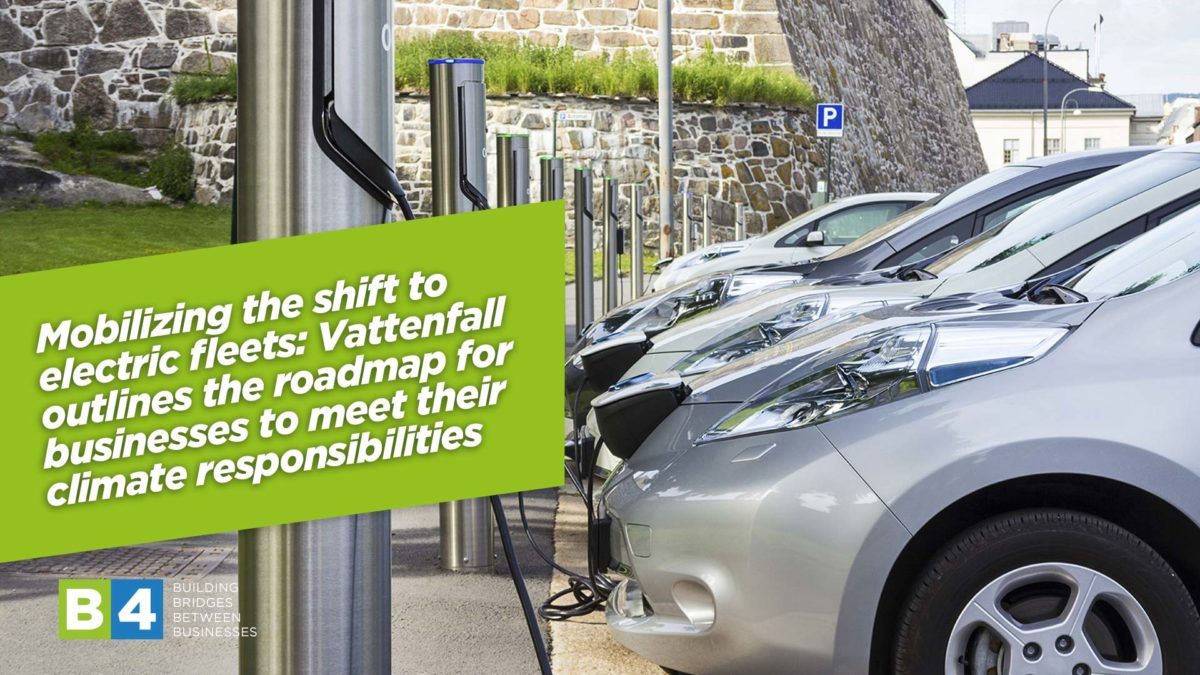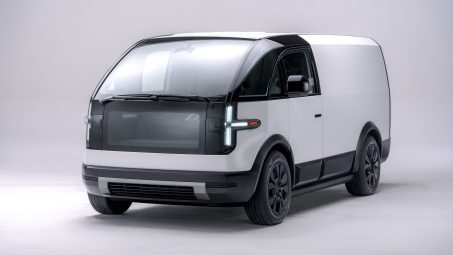
Mobilizing the shift to electric fleets: Vattenfall outlines the roadmap for businesses to meet their climate responsibilities
Understanding eFleet charging infrastructures, a new white paper from European energy company Vattenfall, sets out a roadmap for businesses to facilitate the transition to electric vehicles.
Climate change is one of the greatest challenges facing society. Transport accounts for around one-fifth of global carbon dioxide (CO2) emissions, with road travel contributing a startling three-quarters of that figure. While a shift to zero emission vehicles is underway, that transition needs to go further and faster if we are to avert a climate crisis.
As well as clear environmental benefits, a shift to eFleets offers the opportunity for businesses to strengthen their environmental profile and benefit from cost efficiencies. Understanding eFleet charging infrastructures, a white paper from Vattenfall UK, outlines the processes and options available for electric vehicle charging infrastructures.
E-mobility will play a fundamental role in a more sustainable transport system, but ready and reliable access to charging infrastructure remains a barrier to widespread adoption.
Overcoming charging anxiety
A recent YouGov survey found that although Europe’s second-largest electric car market, the UK general public still feels that electric cars don’t outperform petrol/diesel powered ones in one key area – convenience. The ability to recharge is central to this anxiety. A second survey found that despite a surge in on-street charging, more EV drivers worry about access to charging infrastructure.
“The shift to electric vehicles is going to require a major development in charging infrastructure – and setting up new EV charging facilities will often require an upgrade to deliver the increased electrical demand,” says Stewart Dawson, Managing Director of Vattenfall UK. “If the UK is serious about meeting its ambitious EV targets we need to accelerate the deployment of EV charging and the associated upgrades to the grid.
“Vattenfall can support businesses with both these challenges,” Dawson continues. “By providing CAPEX, owning and operating EV charging infrastructure for our clients, via our Power-as-a-Service offer – and by providing upgraded and new grid connections, which can also incorporate Asset Adoption Value payments back to our clients to help offset the upfront investment, via our IDNO business. Vattenfall aims to enable fossil free living within one generation and we are ready to support UK businesses navigating the transition to become zero carbon.”
The UK government has set out an ambitious roadmap to decarbonize transport, with a goal of at least 50% of new car sales and up to 40% of new van sales ultra-low emission by 2030, and all new car and van sales emission free by 2040. Even more ambitious targets were announced last year, with the sale of purely internal combustion engine vehicles set to end in 2030 and hybrids by 2035.
Added to this, the number of low emission zones across the UK are on the rise, with costly charges in place for vehicles that don’t meet this criterion. With increased duties on petrol and diesel and road tax that penalizes vehicles with higher emissions, the business case for switching to electric fleets is growing. Furthermore, government grants to businesses – including e-Fleet operators – and individuals to aid the purchase of electric vehicles is providing an added incentive.
Vattenfall’s white paper Understanding eFleet charging infrastructures explains how a reliable eFleet electrical infrastructure can work. From what to consider, to an overview of the process of switching to electric vehicles and operating an electric vehicle charging infrastructure, the paper sets out to help businesses make the transition towards a fossil-free future. The paper covers:
- How the charging infrastructure works
- Legal and regulatory considerations
- Options for management, ownership, and operations
Dawson continues: “There’s a number of factors to consider when setting up a new EV fleet. On top of the infrastructure requirements, there’s also legal and regulatory considerations and then the ongoing management and maintenance. For some organisations, a fully managed setup can be an attractive solution, requiring minimal investment and leaving the responsibility for owning and managing all compliance, regulatory and environmental issues with an expert.”
Vattenfall has been providing power as a service for more than 20 years and has the skills and experience to deliver smart, scalable eFleet charging infrastructures, leaving organisations free to concentrate on their core business.
Click here to read the White Paper on Understanding eFleet charging infrastructures.To find out more about how Vattenfall can help you with an eFleet charging infrastructure, visit network-solutions.vattelfall.co.uk/power-as-a-service
About Vattenfall
Vattenfall is a European energy company with approximately 20,000 employees. For more than 100 years we have electrified industries, supplied energy to people’s homes and modernised our way of living through innovation and cooperation. We are determined to enable fossil-free living within one generation. To succeed we must become fossil free ourselves. But that’s not enough. We are looking beyond our own industry to see where we can really make a difference. Together with our partners, we are taking on the responsibility of finding new and sustainable ways to electrify transportation, industries and heating.
More in Leadership

The Season of New Beginnings in Your Leadership Journey
Spring is thought of as the season of new beginnings, bringing new life to plants, trees and flowers and although it may not officially begin until 20th March, now is a great time to think about new beginnings in your own professional journey. This change of season is a great time to reflect on the things that you have planned for the year, and how you are going to accomplish them.

‘Meanwhile in Oxfordshire..’ Case Study: Ducky Zebra, the sustainable kidswear brand...
‘Often girls’ clothes are pink, cute and impractical. They promote kindness, but not always confidence. And boys’ clothes are often blue, aggressive and adventure seeking. They promote confidence, but not always kindness. I wanted to bring these two characteristics together and allow all children, no matter what their gender, to celebrate both kindness and confidence.’ – Sally Dear, Founder of Ducky Zebra

Innovative drone delivery trials take place at Milton Park
A pilot demonstration for a set of innovative drone and electric van freight trials was successfully completed at Milton Park.
From this author

Pioneering US-based Canoo Inc’s versatile electric vehicle experience arrives at Bicester...
Canoo Inc, a US-based company which has created revolutionary multi-purpose platforms and digital ecosystems that are transforming the automotive industry for the entire vehicle lifecycle, has selected Bicester Motion, the 444-acre future mobility estate in Bicester, Oxfordshire, as its UK commercial operations and activation centre.

The Wesley Hotel Euston launches festive dining offering
Celebrate the festive season with delicious food and great company at the centrally located The Wesley Euston hotel, bar and kitchen as it announces two Christmas menus, each tailored to a different dining experience.

Ingram ‘incredibly proud’ after going down fighting in Brands Hatch decider
There was no fairytale ending for Tom Ingram in the 2024 British Touring Car Championship finale at Brands Hatch last weekend (5-6 October), but the former champion went down fighting with a characteristically heroic performance as circumstances cruelly conspired against him.

